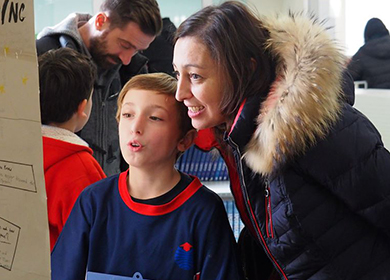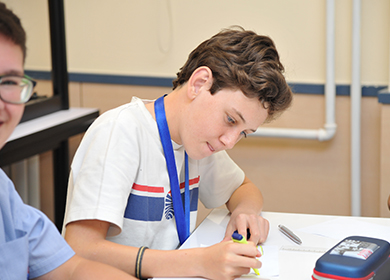Go Back
News
News
How to Help your Child Manage Stress and Anxiety
News
26 Feb, 2020
10 : 00
With transition to a new learning platform, new routines, and a heightened sense of the world around us, it is only natural that we may begin to experience feelings of stress or anxiety. As parents, you can influence your child’s courage and enable them to work through any anxieties they may have. Here are a few tips to help you along the way.
• Check in with your own feelings: ask yourself: What emotions are you experiencing during this time? How are these feelings affecting your behaviors? Acknowledging and sharing your own thoughts/feelings/behaviors with your child will not only normalize the experience, but provide meaningful opportunities for discussion. Perhaps have a daily check in where you use the Zones of Regulation to describe how you are feeling. Green represents being calm, focused and ready to learn. Yellow represents you are alert and may need additional time to get to green. Blue represents feeling down or upset, while red represents frustration. Together you can determine different ways to move around the wheel, with green being the ultimate goal.
• Limit their exposure to reports on the news or social media. These reports can create emotional memories that may produce anxiety. Answer any questions they may have about COVID19, openly and honestly. When you can, watch their shows with them and have discussions to gauge if they are making sense of what they see. Focus on the positive and be sure to highlight the stories of survival and kindness we hear about!
• Encourage acts of kindness. Together find ways your child can give back to the community. This will help to combat any feelings of helplessness they may have.
• Find reasons to be grateful. Together start a family gratitude journal where you highlight the best part of the day, or a time where you felt joyful Perhaps you can write a think you letter to a teacher, friend, or family member. Make a list where you name a book, color, animal, food, or drink you are grateful for the possibilities are endless. Focus in on the little things!
• As much as possible, stick to a “normal” school routine, which means making sure your child is getting enough sleep. With our schedules being altered, it is tempting for children to stay up later. However, an average of at least 9 hours of sleep for adolescents a day is needed for academic readiness. Quality sleep also helps to ward of stress, it may be helpful to keep technology away from children during bedtime hours. 30-60 minutes before bedtime should be screen free time, as screen time affects sleep.
• Online learning is most manageable for students who are motivated. Try helping your child determine a natural order for assignments, perhaps start with those that are the least favorite, completing them earlier when their energy is higher. You may want to work alongside them to help them stay motivated- think of it as family work time! The 25:5 rule may assist as well. Work for 25 minutes, then break for 5 minutes- with an activity of their choosing.
• Share coping strategies for stress with your child and practice them together! Deep breathing, visualizing calm and happy places, stretching, drawing, listening to calm music, exercising are just a few of many. You may also want to check out the following:
Podcasts:Peace Out is a website complete with short stores that help students calm down and relax. Through visualization and guided breathing exercises, it is a perfect way to teach students about mindfulness and self-regulation. https://bedtime.fm/peaceout
Apps:Smiling Mind is a free mindfulness app and website that the entire family can enjoy! Tailored for ages 7 and up, Smiling Mind is a way to help calm and focus students’ brains and bodies.
https://www.smilingmind.com.au/
• Stress is a normal part of life; however, if your child’s stress is impacting their daily lives, it may be time to reach out for further support. Be on the lookout for warning signs:-General lack of energy-Difficulty sleeping -Change in eating patterns-Increased misbehavior, lashing out at family members-Physical complaints (headaches, stomach aches) with no apparent cause
If you notice your child is still worried or anxious, be assured that this is a normal reaction, and continue conversations and providing care for your child. If you find that additional support is needed, please reach out to Student Support to schedule time with you or your child to make a plan on how to support them during this time.












